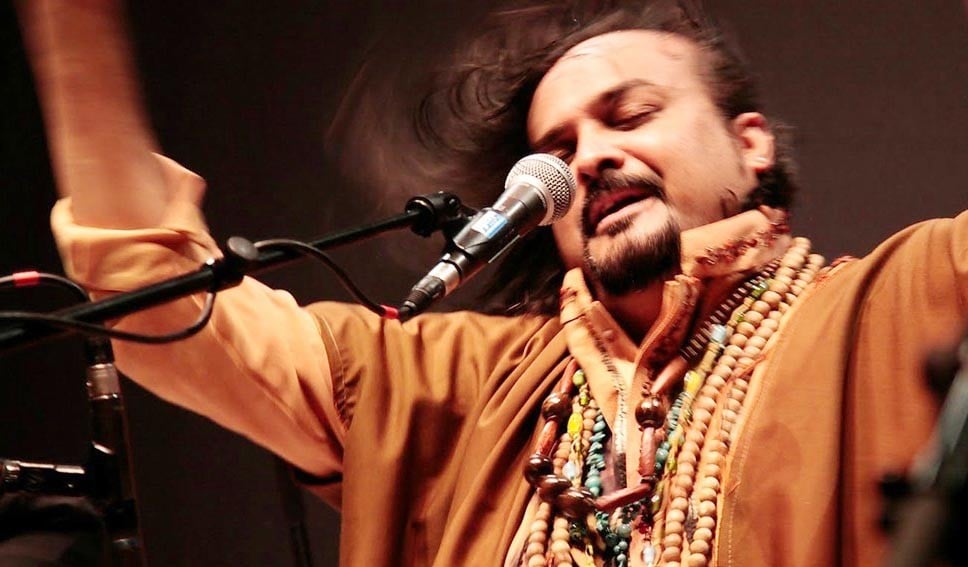
Our tangible disconnect with the past

The assassination of Amjad Sabri in Karachi makes perfect sense to the rational and distanced mind of any analyst. In a perfect model of an Islamic state, according to the puritanical narrative and Arabised ulema, music is strictly proscribed. Any sort of cultural expression is far too subtle a subject for these ulema.
Unluckily, since the commencement of Afghan jihad in 1979, Pakistan’s national narrative has largely been re-defined by them. We have fed our young students with the ideology which does not have any embeddedness in the endogenous tradition that is rooted in the soil. The tradition is usually constituted through the collective consciousness that is recorded and therefore conserved in the accounts of history and geography with its attendant features like climate, language and norms of social life specific to the area. The tradition has to draw on the continuity of history and the sustained affiliation with the geography that people inhabit.
The argument which I have advanced in some of my previous columns is reiterated here: that our national narrative tends to overlook the necessary role that geography plays in the formulation of our tradition. In order to be distinct from our neighbours, we have realigned our geographical links with Arabian peninsula (Some scholars have worked assiduously hard to align Pakistan with Central Asia by tracing Pakistani people’s civilisational affinity with the areas currently constituting Uzbekistan. But somehow that project failed to fructify.)
Reverting to the discursive analysis, while looking a bit closely, one may aver that the problem is not confined only to the segregation of history and geography. The issue at hand is quite complex.
If it is argued that history has multiple features, like for instance religious and physical (one may read it as genetic). Our religious history links us up with Arabian peninsula but then genetic and racial antecedents bind us with our own soil. Generally, the physical space tends to mould the religious beliefs and practices in accordance with the social exigencies typically associated with the former.
In the medieval era, at a certain level, the beliefs and practices were allowed to absorb the local influences with the result that South Asia came to have its own brand of religion and music; art was an inalienable part of it. But history is generally understood as the sum total of physical/genetic past, punctuated with the sensibility emanating from the socially-mediated norms of living. The narrative that is fomented in Pakistan plays down all that belongs to the soil, be it physical/genetic past or the social norms evolving out of human interaction. Religious Puritanism has completely taken over at the expense of history. Any puritan interpretation of the religion does not accept such social norms evolving out of the phenomenon of history.
Simply put, in the context of South Asia, religion is bound to engage with the socio-cultural ethos. Those who have taken it upon themselves to decide about the national narrative must be quite clear about it. However, one must bear in mind that any revision of the narrative would an uphill task. With so many maulvis invading the private space almost all the time through idiot box, any substantial revision in the narrative seems extremely difficult if not impossible. Proliferation of so many channels have vicariously re-inforced the unilateral understanding of the religion with catastrophic repercussions.
In the current scenario, asking question(s) about religion and its role in the affairs of the state or the state’s agency about settling some political issue by invoking religion may lead to a perilous situation. What followed after the question put up by Hamza Ali Abbasi to the ‘ulema’ was not at all surprising. Apparently, an innocuous question about state’s role in the matters of religion has landed him in a very difficult situation.
Interestingly, Abbasi being an actor traces and then locates his identity in religion, which is a contradiction in itself. In our narrative, the way it stands at the moment, acting or singing as a career is at least not respectable if altogether prohibited. So our youth is living in a world rife with dichotomies.
The youngsters living in the globalised/modern world encounter confusion when it comes to the question of their identity. Acting is accepted as a coveted profession in the modern world; but the question is whether we exist in the modern world.
In order to unravel this confusion, we are left with no option but to turn to history yet again. Like everybody else, we live in the present carrying our past with us. That situation is generally very helpful because the past sometimes endorses the present’; at times, the former vindicates the latter. That happens because the present is born out of the past; therefore both are tied up with each other.
In our case, the present that we inhabit has a tangible disconnect with the past. More importantly, the locale of our past is absolutely different from the locale of our present. My point in this article is that we must have a similar locale of our past and the present. That is imperative for resolving the confusion which has overtaken us with particular respect to culture and the modes of its expression.
In order to understand the importance of our culture, we need to establish the link between our past and present. In order to do that, the bold decision of revising our narrative is the need of the hour.